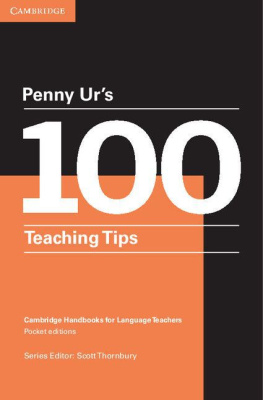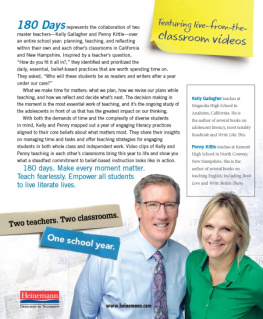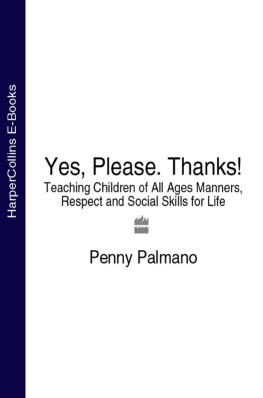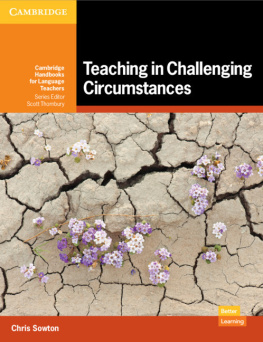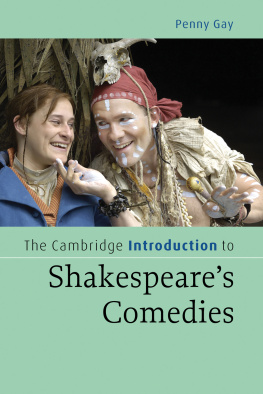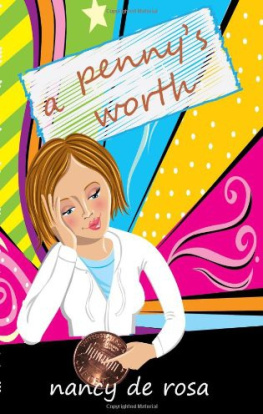Penny Ur's 100 Teaching Tips
Cambridge Handbooks for Language Teachers
This series, now with over 50 titles, offers practical ideas, techniques and activities for the teaching of English and other languages, providing inspiration for both teachers and trainers.
The Pocket Editions come in a handy, pocket-sized format and are crammed full of tips and ideas from experienced English language teaching professionals, to enrich your teaching practice.
Recent titles in this series:
Grammar Practice Activities (Second edition) A practical guide for teachers Penny Ur
Vocabulary Activities Penny Ur
Classroom Management Techniques Jim Scrivener
CLIL Activities A resource for subject and language teachers Liz Dale and Rosie Tanner
Language Learning with Technology Ideas for integrating technology in the classroom Graham Stanley
Translation and Own-language Activities Philip Kerr
Language Learning with Digital Video Ben Goldstein and Paul Driver
Discussions and More Oral fluency practice in the classroom Penny Ur
Penny Ur's 100 Teaching Tips
Penny Ur
Consultant and editor: Scott Thornbury
University Printing House, Cambridge CB2 8BS, United Kingdom
Cambridge University Press is part of the University of Cambridge.
It furthers the University's mission by disseminating knowledge in the pursuit of education, learning and research at the highest international levels of excellence.
www.cambridge.org
Information on this title: www.cambridge.org/9781316507285
Cambridge University Press 2016
This publication is in copyright. Subject to statutory exception and to the provisions of relevant collective licensing agreements, no reproduction of any part may take place without the written permission of Cambridge University Press.
First published 2016
Printed
A catalogue record for this publication is available from the British Library
ISBN 978-1-316-50728-5 Paperback
ISBN 978-1-316-50729-2 Apple iBook
ISBN 978-1-316-50730-8 Google ebook
ISBN 978-1-316-50731-5 Kindle ebook
ISBN 978-1-316-50732-2 eBooks.com ebook
Cambridge University Press has no responsibility for the persistence or accuracy of URLs for external or third-party internet websites referred to in this publication, and does not guarantee that any content on such websites is, or will remain, accurate or appropriate.
Contents
Why I wrote this book
English teachers in the course of their teaching careers accumulate a wealth of practical know-how about classroom teaching. But few of them publish this knowledge mainly because they simply don't have the time. (There are, of course, websites with teaching guidance of one kind or another, though many of these are not very practical, and it takes a lot of surfing to find good ones.) So an enormous number of experienced-based insights discovered by expert teachers in the course of their teaching careers are lost as far as future generations of teachers are concerned. The result is that many new teachers find themselves laboriously re-inventing the wheel, or discovering a useful teaching idea much too late, when they could have shortened the process by learning from their predecessors. (Why did nobody tell me?!)
So having myself retired from school teaching though I still teach academic English to adults it seemed a good idea to write my own set of practical tips, from which other teachers might benefit.
I started teaching English in a primary school in Israel in 1968. It was a fairly discouraging experience at first, with lots of discipline problems and misunderstandings, since I didn't know my students language very well, and wasn't familiar with the culture. I remember telling a colleague at the end of my first year that I didn't think I should continue because I was clearly not suited to English teaching. He told me to stop thinking so much about my own problems and look at my students: ask myself whether they were learning from my lessons, and whether they were motivated to continue learning. If they were, he said, I was a successful teacher and should continue. So I did, and I did. I suppose this is my first and perhaps most basic tip: don't worry so much about yourself and your teaching, look at the students, and what and how they are learning. Anyhow, I went on to teach English in primary and secondary classes in State schools with some breaks to teach university courses or to study until I retired in 2006. I must have clocked up thousands of hours of classroom teaching. My professional knowledge derives primarily from that experience, and is the basis of the tips in this book.
I suggest you don't try to read straight through the book, but rather browse through it looking for headings that interest you. The topics are listed alphabetically, each followed by a set of associated tips. (If you don't find the topic you want, try the Index.) Each tip appears at the top of a page, followed by comments which include personal anecdotes, examples of classroom procedures, references to research or internet sources or anything else I thought you might find interesting or helpful.
Some of the ideas may be familiar; others you may have come across in the past but need to be reminded of; yet others may be quite new. In any case, be aware that not all may be right for you. My professional experience is, obviously, based on my own situation and yours may be quite different, as may your teaching personality and the character and expectations of your students. So you may find you need to modify or adapt some of the tips, or even completely reject them. Please don't regard them as directives from an authority, but as suggestions from a colleague: use them selectively and critically.
With this reservation in mind, read on. I hope that you will find enough interesting and useful teaching ideas to make your reading worthwhile.
Beginning and ending the lesson
Teacher courses often include a unit on lesson-planning, which relates mostly to the selection of the lesson components, and how these will be ordered. But it's important also to think about how you'll frame the lesson with effective beginnings and endings.
Start with a smile
It is important to make eye-contact with your students and smile as you greet them at the beginning of the lesson.
In my early years of teaching I was a bit scared of my students, and was tense and serious at the beginning of lessons. In retrospect, it took me far too long to learn to relax and smile but it made a huge difference when I did. Don't be put off if some of the students don't respond; most of them will. And remember: a serious or neutral expression on your face does not convey a neutral message it conveys a negative one (I'm here because I have to be, not because I have the slightest pleasure in teaching you!), which can be easily be changed by a smile.
Non-verbal communication, including facial expression, body language and gesture, plays a key role in maintaining your relationship with the students in a class. It does not, as a popular myth would have it, convey 50% or more of the actual messages coming across in a conversation, but it's still important. Try searching online for the phrase non-verbal communication and you'll find a lot of very useful guidance. Most of the websites relate to personal relationships in the context of employment in general, but can be readily applied to classroom interaction.

